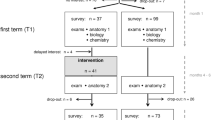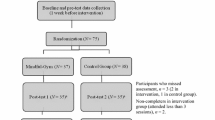Abstract
The inability to cope successfully with the enormous stress of medical education may lead to a cascade of consequences at both a personal and professional level. The present study examined the short-term effects of an 8-week meditation-based stress reduction intervention on premedical and medical students using a well-controlled statistical design. Findings indicate that participation in the intervention can effectively (1) reduce self-reported state and trait anxiety, (2) reduce reports of overall psychological distress including depression, (3) increase scores on overall empathy levels, and (4) increase scores on a measure of spiritual experiences assessed at termination of intervention. These results (5) replicated in the wait-list control group, (6) held across different experiments, and (7) were observed during the exam period. Future research should address potential long-term effects of mindfulness training for medical and premedical students.
Similar content being viewed by others
References
Anderson, K. O., and Masur, F. T. III (1989). Psychological preparation for invasive medical and dental procedures. J. Behav. Med. 6: 1–40.
Antonovsky, A. (1987). Unraveling the Mystery of Health: How People Manage Stress and Stay Well, Jossey-Bass, San Francisco.
Astin, J. (1997). Stress-Reduction Through Mindfulness Meditation: Effects on Psychological Symptomatology, Sense of Control, and Spiritual Experiences. Master's thesis, submitted for publication.
Bandura, A., O'Leary, A., Taylor, C. B., Gauthier, J., and Gossard, D. (1987). Perceived self-efficacy and pain control: Opioid and nonopioid mechanisms. J. Person. Soc. Psychol. 53: 563–571.
Beck, A. T. (1976). Cognitive Therapy and the Emotional Disorders, International Universities Press, New York.
Benson, H. (1975). The Relaxation Response, Morrow, New York.
Berkman, L. (1995). The role of social relations in health promotion. Psychosomat. Med. 57: 245–254.
Derogatis, L. (1977). The SCL-90-R: Administration, Scoring and Procedures Manual 1, Clinical Psychometric Research, Baltimore.
Egbert, L. D., Battit, G. E., Welch, C. E., and Bartlett, M. K. (1964). Reduction of postoperative pain by encouragement and instruction of patients. A study of doctor-patient rapport. New Engl. J. Med. 270: 825–827.
Ellis, A. (1962). Reason and Emotion in Psychotherapy, Lyle Stuart, New York.
Fawzy, F., Fawzy, N., Hyun, C., Elashoff, R., Guthrie, D., Fahey, F., and Morton, D. (1993). Malignant melanoma: Effects of an early structured psychiatric intervention, coping, and Affective state on recurrence and survival 6 years later. Arch. Gen. Psychiat. 50: 681–689.
Gallegos, K. V., Bettinardi-Angres, K., and Talbott, G. D. (1990). The effect of physician impairment on the family. Maryland Med. J. 39: 1001–1007.
Hawks, S. R., Hull, M. L., Thalman, R. L., and Richins, P. M. (1995). Review of spiritual health: Definition, role, and intervention strategies in health promotion. Am. J. Health Promot. 9: 37–1378.
Jemmott, J. B., Borysenko, J. Z., Borysenko, M., McClelland, D. C., Chaptman, R., Meyer, D., and Benson, H. (1983). Academic stress, power motivation, and decrease in salivary secretory immunoglobulin A secretion rate. Lancet 1: 1400–1402.
Johnson, N. P., Michels, P. J., and Thomas, J. C. (1990). Screening tests identify the prevalence of alcohol use among freshman medical students and among students' family of origin. J. South Carolina Med. Assoc. 86: 13–14.
Kabat-Zinn, J. (1982). An outpatient program in behavioral medicine for chronic pain patients based on the practice of mindfulness mediation: Theoretical considerations and preliminary results. Gen. Hosp. Psychiat. 4: 33–47.
Kabat-Zinn, J. (1993). Mindfulness meditation: Health benefits of an ancient Buddhist practice. In Goleman and Gurin (Eds.), Mind / Body Medicine, Consumer Reports Books, New York, pp. 259–275.
Kabat-Zinn, J. (1996). Mindfulness meditation: What it is, what it isn't, and its role in health care and medicine. In Haruki, Ishii, Y., and Suzuki, M. (Eds.), Comparative and Psychological Study on Meditation, Eburon, Netherlands, pp. 161–170.
Kabat-Zinn, J., and Chapman-Waldrop, A. (1988). Compliance with and outpatient stress reduction program: Rates and predictors of program completion. J. Behav. Med. 11(4): 333–352.
Kabat-Zinn, J., Lipworth, L., and Burney, R. (1985). The clinical use of mindfulness meditation for the self-regulation of chronic pain. J. Behav. Med. 8: 163–190.
Kabat-Zinn, J., Massion, A. O., Kristeller, J., Peterson, L. G., Fletcher, K. E., Pbert, L., Lenderking, W. R., and Santorelli, S. (1992). Effectiveness of a meditation based stress reduction program in the treatment of anxiety disorders. Am. J. Psychiat. 149: 936–943.
Kass, J. (1995). Contributions of religious experience to psychological and physical well-being: Research evidence and an explanatory model. In VandeCreek, L. (Ed.), Spiritual Needs and Pastoral Services: Readings in Research, Journal of Pastoral Care Publications, Decatur, Georgia, pp. 189–213.
Kass, J., Friedman, R., Leserman, J., Zuttermeister, P., and Benson, H. (1991). Health outcomes and a new measure of spiritual experience. J. Sci. Study Rel. 30(2): 203–211.
Kass, J. (1997). Tapping into Something Greater than Ourselves: The Health Effects of Spirituality (manuscript submitted).
La Monica, E. (1981). Construct validity of an empathy instrument. Res. Nurs. Health 4: 389–400.
Lazarus, R. S., and Folkman, S. (1984). Stress, Appraisal, and Coping, Springer, New York.
Lee, C. (1987). Professionals in medical settings: The research evidence in the 1980s. J. Org. Behav. Mgt. 8: 195–213.
Lesh, T. V. (1970). Zen meditation and the development of empathy in counselors. J. Human. Psychol. 10: 39–74.
Levin, J. S. (1994). Religion and health: Is there an association, is it valid, and is it causal? Soc. Sci. Med. 38: 1475–1482.
McCabe, P. M., and Schneiderman, N. (1985). Psychophysiologic reactions to stress. In Schneiderman, N., and Tap, J. T. (Eds.), Behavioral Medicine: The Biopsychosocial Approach, Erlbaum, Hillsdale, NJ.
McClelland, D. C. (1989). Motivational factors in health and disease. Am. Psychol. 44(4): 675–683.
Pastore, F. R., Gambert, S. R., Plutchik, A., and Plutchik, R. (1995). Empathy Training for Medical Students. New York Medical College (unpublished manuscript).
Pennebaker, J. W., Kiecolt-Glaser, J. K., and Glaser, R. (1988). Disclosure of traumas and immune function: Health implications for pschotherapy. J. Consult. Clin. Psychol. 56: 239–245.
Pitts, F. N., Winokur, G., and Stewart, M. A. (1961). Psychiatric syndromes, anxiety symptoms and responses to stress in medical students. Am. J. Psychiat. 118: 333–340.
Richings, J. C., Khara, G. S., and McDowell (1986). Suicide in young doctors. Brit. J. Psychiat. 149: 475–478.
Rogers, C. R. (1961). On Becoming a Person, Houghton Mifflin Company, Boston, MA.
Russek, L., and Schwartz, G. E. (1997). Feelings of Parental Caring Predict Health Status in Midlife: A 35-year follow-up of the Harvard Mastery of Stress Study. Behav. Med. 20: 1–13.
Salt, P., Nadelson, C., and Notman, M. (1984). Depression and Anxiety Among Medical Students. New Research Abstract 13, APA Annual Meeting, Los Angeles.
SAS Institute (1985). SAS User's Guide: Statistics, Version 5, SAS Institute, Cary, North Carolina.
Sbarbaro, J. A. (1990). The patient-physician relationship: Compliance revisited. Ann. Allergy 64: 325–331.
Schwartz, G. E. (1984). Psychobiology of health: A new synthesis. In Hammonds, B. L., and Scheirer, C. J. (Eds.), Psychology and Health: Master Lecture Series (Vol. 3), American Psychological Association, Washington, D.C., pp. 145–195.
Seligman, M. E. P. (1975). Helplessness: On Depression, Development and Death, Freeman, San Francisco.
Selye, H. (1976). The Stress of Life (rev. ed.), McGraw-Hill, New York.
Shapiro, D. H. (1982). Overview: Clinical and physiological comparisons of meditation with other self-control strategies. Am. J. Psychiat. 139: 267–274.
Shapiro, D. H., Schwartz, C. E., and Astin, J. (1996). Controlling ourselves, controlling our world: Psychology' s role in understanding positive and negative consequences of seeking and gaining control. Am. Psychol. 51(12): 1213–1230.
Shapiro, S. L., and Schwartz, G. E. (in press). The role of intention in self-regulation: Toward intentional systemic mindfulness. In Boekaerts, M., Pintrich, P. R., and Zeidner, M. (Eds.), Handbook of Self-Regulation, Academic Press, New York.
Smith, T. C., and Thompson, T. L. (1993). The inherent, powerful therapeutic value of a good physician-patient relationship. Psychosomat. Med. 34: 763–766.
Spiegel, D., Bloom, J., Kraemer, H. C., and Gottheil, E. (1989). Effect of psychosocial treatment on survival of patients with metastatic breast cancer. Lancet 2: 888–891.
Spielberger, C. D., Gorsuch, R. C., and Lushene, R. E. (1970). Manual for the State-Trait Anxiety Inventory, Consulting Psychologists, Palo Alto.
White, L., Tursky, B., and Schwartz, G. E. (Eds.) (1985). Placebo: Theory, Research and Mechanisms, Guilford Press, New York.
Williams, R. B., Jr., Barefoot, J. C., and Shekelle, R. B. (1985). The health consequences of hostility. In Chesney, M. A., and Rosenman, R. H. (Eds.), Anger and Hostility in Cardiovascular and Behavioral Disorders, Hemisphere/McGraw-Hill, New York, pp. 173–185.
Rights and permissions
About this article
Cite this article
Shapiro, S.L., Schwartz, G.E. & Bonner, G. Effects of Mindfulness-Based Stress Reduction on Medical and Premedical Students. J Behav Med 21, 581–599 (1998). https://doi.org/10.1023/A:1018700829825
Issue Date:
DOI: https://doi.org/10.1023/A:1018700829825




